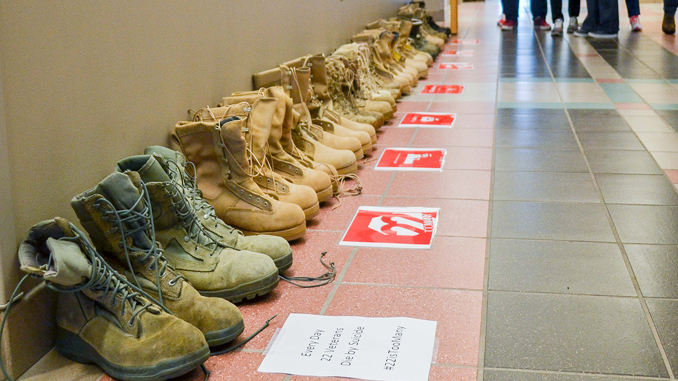On January 16, 2018 Washington State University quarterback Tyler Hilinski chose to take his own life at 21 years old. The news was a shock to his teammates, friends and family. He was a man with great potential for a bright future in both athletics and academics. Tyler Hilinski’s brother, Kelly Hilinski said at his younger brothers memorial that he had “spent the past weeks trying to comprehend what was truly incomprehensible.” The signs of depression and other mental illnesses can be nearly invisible to those who don’t know how to recognize them and can eventually manifest into tragic events such as this.
In an effort to help students recognize such signs and symptoms, WSU Vancouver Counseling Services presented a Suicide Intervention and Prevention Seminar on Thursday, April 12th in accordance with Health Week. The seminar covered topics such as risk factors for suicide, how to recognize signs that someone might be suicidal and how to care for yourself when someone in your life is struggling with mental health issues or suicidal thoughts.
The seminar began with some shocking statistics, presented by Thomas La Marr. Suicide is the second leading cause of death in Washington for persons aged 10 to 34, and third for ages 35 to 44. This is 10 percent higher than the national average. In fact, across campus counseling centers nationwide, suicidal thoughts are the fifth most common reason for visiting, with mood disorders such as depression and anxiety accounting for half of all visits.
It is important to remember that everyone is at risk for suicidal thoughts and tendencies, regardless of previous mental health. However, certain groups are at higher risk than others. Although statistics have shown that females attempt suicide more often than males, men are four times more likely to succeed with their attempt. This is because of the differing methods used by the genders; men typically commit suicide with a fatal gunshot, whereas women typically attempt to overdose on various drugs. The success rate for overdose is 1.8 percent according to “Suicide and Attempted Suicide: Methods and Consequences” by Geo Stone, because drugs such as benzodiazepines induce a coma-like state for two to three days, while narcotics are vomited a short while after ingestion.
Members of the LGBTQ community are three three times more likely to contemplate suicide, and five times more likely to make an attempt on their own lives. These attempts are often more severe and more likely to require medical attention. Perhaps the most oppressed and stigmatized of this group, transgendered people, have some of the most frequent suicide attempts, with 40 percent of the transgender population attempting suicide before the age of 25.
Thomas La Marr, as well as co-presenter Lindsay Randall, at the seminar workshop highlighted the importance of remaining aware of the resources available, both for personal situations and the sake of loved ones. WSU Vancouver counseling services offers 15 free sessions to enrolled students. For general help, Cougar Care takes place every Thursday at 5:00 p.m. in Classroom Building, room 160. Cougar Care consists of group sessions which cover general topics to help with stress and mental health, such as practicing mindfulness and stress management techniques.
The presenting counselors want everyone to know that counseling does help, even when it feels like all hope is lost. If someone you know is in distress, you may visit www.aware.vancouver.wsu.edu to report your concern for the student’s wellbeing. If you fear someone is in immediate danger, call 911. Randall states that talking to someone who you believe is suicidal is always the right thing to do. While it is considered important to practice empathy and quality communication skills, saying something is better than saying nothing at all. A main point counselors Thomas La Marr and Lindsay Randall highlighted during the workshop was the fact that asking if someone is suicidal does not increase the likelihood that they will commit suicide.
A study by the School of Medicine in King’s College, London found that there was no statistically significant increase of suicide after inquiring about suicidal thoughts. In fact, their findings suggest how “acknowledging and talking about suicide may in fact reduce, rather than increase suicidal ideation, and may lead to improvements in mental health in treatment-seeking populations.” Although certain groups such as veterans and the LGBTQ community are less likely to seek treatment, one can be confident in knowing there is no harm in asking.
Another important fact mentioned in the workshop focused on the idea that helping someone who struggles with mental health issues can weigh on a person’s own mental health. Self-care is incredibly important in times like these. Always remember that you cannot handle everything yourself; mental health care should be handled by trained professionals.
Crisis Lines
National: 1-800-273-8255
Crisis Text Line: 741741
LGBTQ: Trevor Project: 866-488-7386
TransLifeline: (877) 565-8860
Ayuda en Español: 1-888-628-9454
Veteran Crisis Line: 1-800-273-8255
